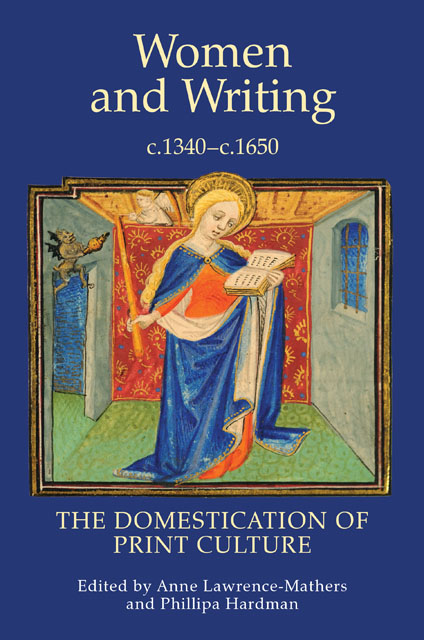Book contents
- Frontmatter
- Contents
- List of Plates
- List of Contributors
- Abbreviations
- Introduction
- Domestic Learning and Teaching: Investigating Evidence for the Role of ‘Household Miscellanies’ in Late-Medieval England
- Domesticating the Calendar: The Hours and the Almanac in Tudor England
- ‘a briefe and plaine declaration’: Lady Anne Bacon’s 1564 Translation of the Apologia Ecclesiae Anglicanae
- Frances Wolfreston’s Chaucer
- Commonplace Book Culture: A List of Sixteen Traits
- Women, Politics and Domesticity: The Scribal Publication of Lady Rich’s Letter to Elizabeth I
- ‘yr scribe can proove no nessecarye consiquence for you’?: The Social and Linguistic Implications of Joan Thynne’s using a Scribe in Letters to her Son, 1607–11
- Fathers and Daughters: Four Women and Their Family Albums of Verse
- The Book as Domestic Gift: Bodleian MS Don. C. 24
- ‘like hewen stone’: Augustine, Audience and Revision in Elizabeth Isham’s ‘Booke of Rememberance’ (c. 1639)
- Female Voices in Early Seventeenth Century Pamphlet Literature
- Select bibliography
- Index
- Misscellanious Endmatter
Domesticating the Calendar: The Hours and the Almanac in Tudor England
Published online by Cambridge University Press: 01 March 2023
- Frontmatter
- Contents
- List of Plates
- List of Contributors
- Abbreviations
- Introduction
- Domestic Learning and Teaching: Investigating Evidence for the Role of ‘Household Miscellanies’ in Late-Medieval England
- Domesticating the Calendar: The Hours and the Almanac in Tudor England
- ‘a briefe and plaine declaration’: Lady Anne Bacon’s 1564 Translation of the Apologia Ecclesiae Anglicanae
- Frances Wolfreston’s Chaucer
- Commonplace Book Culture: A List of Sixteen Traits
- Women, Politics and Domesticity: The Scribal Publication of Lady Rich’s Letter to Elizabeth I
- ‘yr scribe can proove no nessecarye consiquence for you’?: The Social and Linguistic Implications of Joan Thynne’s using a Scribe in Letters to her Son, 1607–11
- Fathers and Daughters: Four Women and Their Family Albums of Verse
- The Book as Domestic Gift: Bodleian MS Don. C. 24
- ‘like hewen stone’: Augustine, Audience and Revision in Elizabeth Isham’s ‘Booke of Rememberance’ (c. 1639)
- Female Voices in Early Seventeenth Century Pamphlet Literature
- Select bibliography
- Index
- Misscellanious Endmatter
Summary
The printed almanacs of sixteenth-century England represent something of a challenge to historians. On the one hand it is clear that, in their own time, these publications were enormously popular and influential; but on the other hand their printed contents are so formulaic and repetitive as to appear almost empty of valuable information. Their most striking feature is the ubiquity of astrological terminology and information. This, together with the scale of their popularity, has led to their being considered in the past as ‘merely’ the repository of what was seen as popular superstition. The Victorian editors and cataloguers who did so much to make the contents of archives known to scholars tended to pass rapidly over the almanacs, and it was only in the first quarter of the twentieth century that one scholar took on the enormous task of cataloguing and discussing all the known and surviving versions of English almanacs up to the year 1600. This scholar, Eustace Bosanquet, also traced a brief history of their development in his introduction to a facsimile edition of Thomas Buckminster’s Prognostication for 1598. This brief narrative opens with the late fifteenth century enterprises of pioneer printers such as Wynkyn de Worde, who produced almanacs setting out the phases of the moon, and lists of dates of movable feasts, for up to twelve years at a time. As Bosanquet here points out, it was not until the second half of the sixteenth century that the concept of combining an almanac and prognostication, both calculated for the year immediately following publication, became standardized. This immediately raises questions about the relationship between the rise of the almanacs and the impact of both the new medium of print and of the Reformation; however, both of these are outside the scope of Bosanquet’s brief account.
B. S. Capp, in his full-length study of English almanacs, published in 1979, still considers almanacs predominantly as illustrative of the public’s belief in, and fascination with, astrological prediction. The title of his monograph is Astrology and the Popular Press: English Almanacs 1500–1800, and the first chapter, on ‘The Development of the Almanac’, focuses primarily on the history of the publication of astrological predictions in the late fifteenth century, and of how these were harnessed into highly popular annual publications which became, by the late sixteenth century, the familiar, annual ‘Almanac and Prognostication’.
- Type
- Chapter
- Information
- Women and Writing, c. 1340-c. 1650The Domestication of Print Culture, pp. 34 - 61Publisher: Boydell & BrewerPrint publication year: 2010



